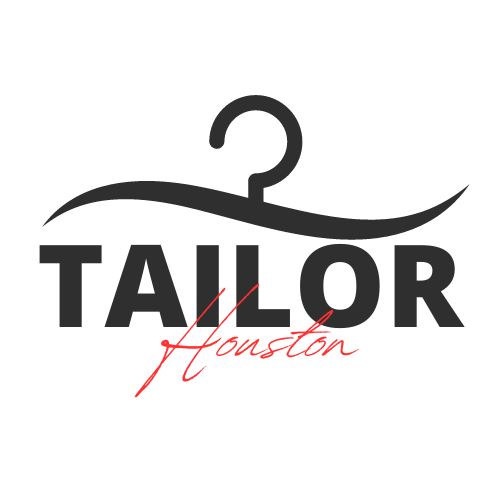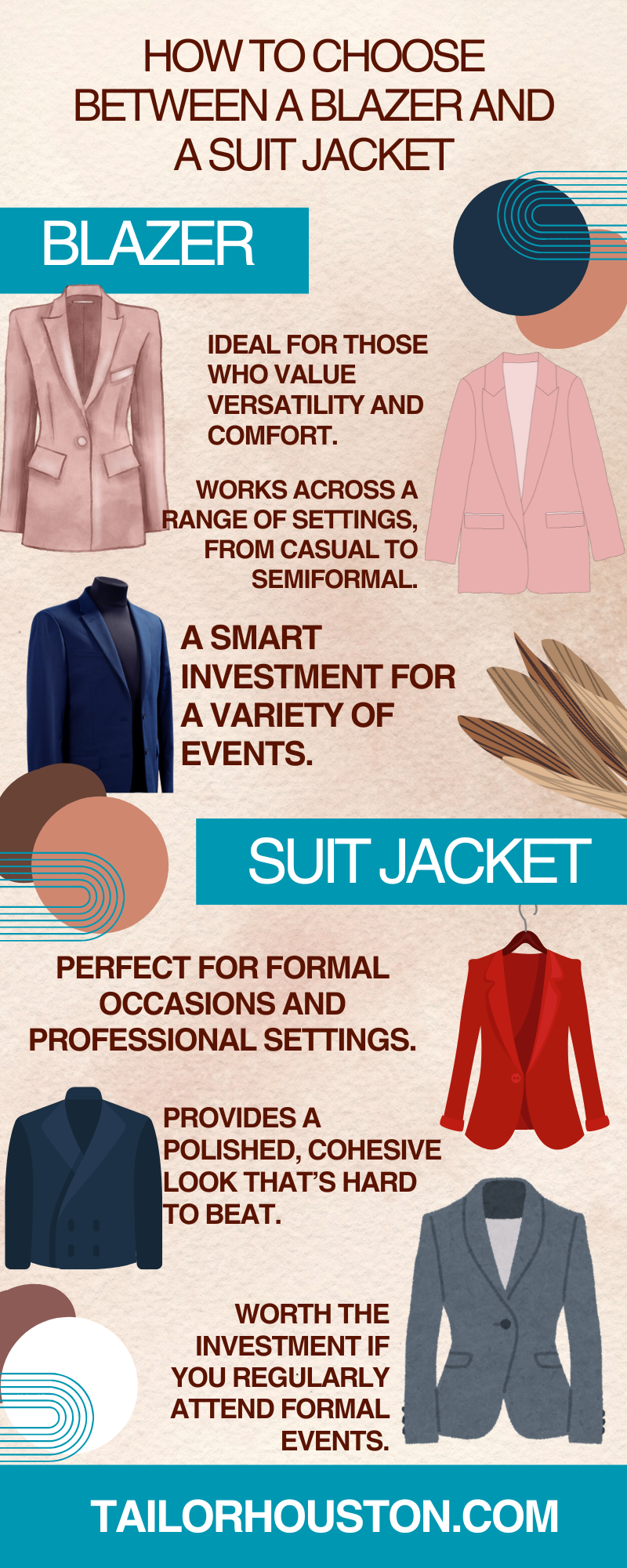When you think of sharp dressing, two essential items often come to mind: the blazer and the suit jacket. These garments have long been cornerstones of men’s and women’s fashion, each playing a crucial role in both professional and casual wardrobes.
Yet, despite their similarities, there are subtle but significant differences that can make one a better choice over the other, depending on the occasion.
- Blazer:
- More versatile and casual than a suit jacket.
- Traditionally made from sturdy fabrics like wool or cotton.
- Comes in various colors and patterns, often featuring metal buttons for a touch of flair.
- Suit Jacket:
- Designed as part of a matching set with trousers.
- Made from finer fabrics like worsted wool.
- Typically features a more formal, structured design with solid colors or subtle patterns.
The Versatility Factor
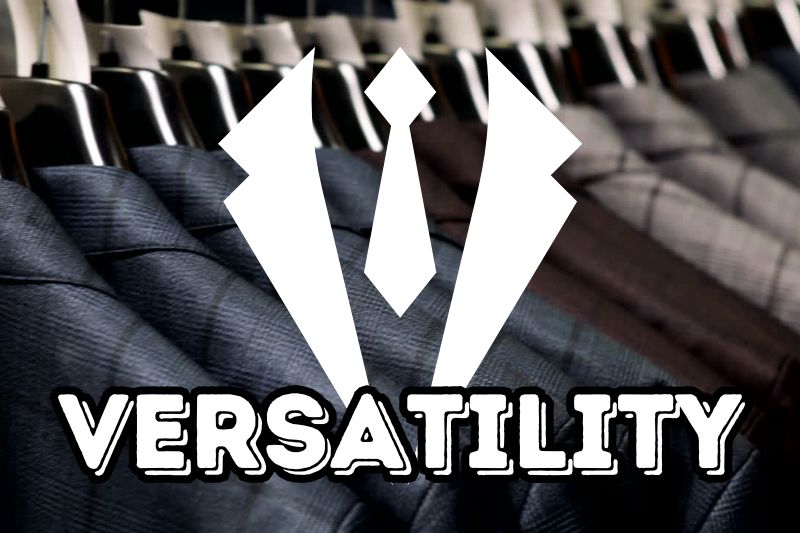
When considering whether to invest in a blazer or a suit jacket, versatility is a key factor. Let’s look at how each item fares in different scenarios.
Blazers for Casual and Semi-Formal Occasions
One of the biggest advantages of a blazer is its adaptability. Blazers can be dressed up or down, making them a wardrobe staple for various occasions. Pair a navy blazer with chinos and a crisp white shirt for a classic look, or throw one over jeans and a T-shirt for a smart-casual vibe.
The range of styles and fabrics available for blazers allows you to express your personality while remaining polished.
Suit Jackets for Formal Events
While blazers excel in versatility, suit jackets are the go-to choice for formal events. Whether you’re attending a wedding, a business meeting, or a formal dinner, a suit jacket paired with matching trousers provides a cohesive and sophisticated appearance. The structured design and high-quality fabrics used in suit jackets contribute to a more refined look that’s perfect for occasions where first impressions matter.
Fit and Comfort
No matter how stylish a blazer or suit jacket is, if it doesn’t fit well, it won’t look good. Fit is paramount in determining which garment will serve you better.
Blazer Fit
Blazers are typically cut to allow for more movement and comfort, which is why they’re often the preferred choice for less formal settings. The relaxed fit of a blazer makes it easier to layer over sweaters or thicker shirts, providing additional flexibility in your wardrobe choices. Blazers often feature softer shoulders and a more casual drape, adding to their comfort level.
Suit Jacket Fit
Suit jackets are designed to fit closely to the body, creating a sleek silhouette. While this provides a more polished appearance, it can also limit movement, making suit jackets less comfortable for all-day wear. However, the tailored fit of a suit jacket is unmatched when it comes to creating a sharp, professional look. The structured shoulders, cinched waist, and clean lines of a suit jacket contribute to its formal appeal.
Fabric Choices
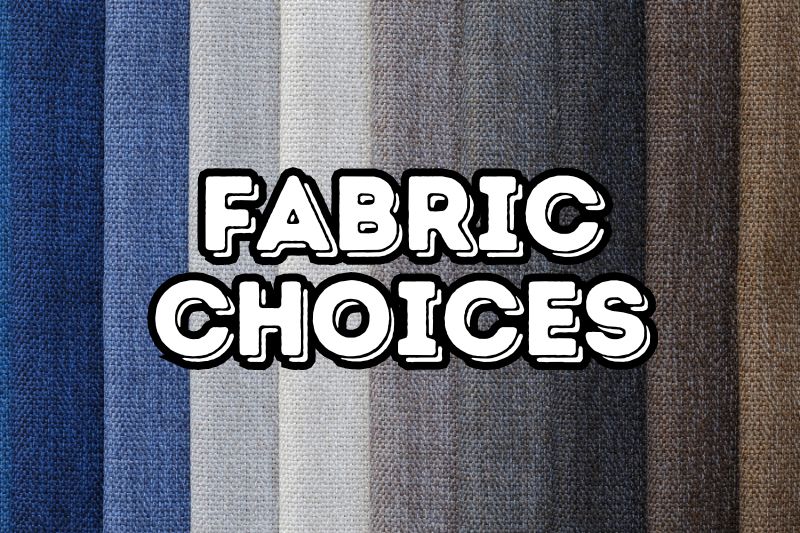
The fabric of a jacket can greatly influence its comfort, appearance, and suitability for different occasions. Here’s how the materials typically used in blazers and suit jackets stack up.
Blazer Fabrics
Blazers are made from a variety of fabrics, each offering different benefits. Wool blazers are ideal for cooler weather, providing warmth without sacrificing style. Cotton and linen blazers are lightweight and breathable, making them perfect for spring and summer.
The choice of fabric also influences the overall look of the blazer—tweed adds a touch of British charm, while velvet brings a luxurious feel suitable for evening events.
Suit Jacket Fabrics
Suit jackets are usually made from finer fabrics, with wool being the most common. Worsted wool, known for its durability and smooth finish, is a popular choice for business suits. Lighter fabrics like linen or a wool-silk blend are used in summer suits, offering breathability and comfort in warmer weather.
The fabric of a suit jacket is often chosen to match the occasion and the season, ensuring that the wearer looks and feels great.
Style Considerations
Style is subjective, but there are certain elements that can guide you in choosing between a blazer and a suit jacket.
Blazer Style
Blazers come in various styles, from single-breasted to double-breasted, with a range of lapel options. A single-breasted blazer with notch lapels is the most versatile and can be worn in both casual and semi-formal settings.
Double-breasted blazers, with their overlapping front panels, offer a more formal and commanding look. The style you choose should reflect your personal taste and the occasions you plan to wear the blazer for.
Suit Jacket Style
Suit jackets are typically single-breasted with either notch or peak lapels, though double-breasted options are also available for those who prefer a bolder look. The style of a suit jacket is often dictated by current fashion trends and the formality of the occasion.
Slim-fit suits are popular for a modern, sleek appearance, while classic cuts provide a timeless look. The choice of lapels, vents, and buttons can further customize the style of your suit jacket.
Longevity and Investment
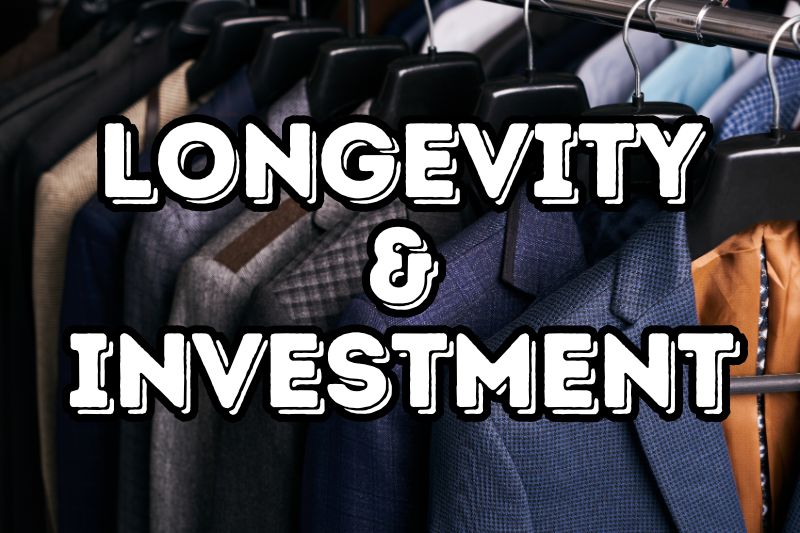
When investing in clothing, it’s important to consider how long the item will last and whether it’s worth the price.
Blazer Longevity
Blazers, given their versatile nature, can be a smart investment. A high-quality blazer made from durable fabric can last for years, especially if it’s a classic style that doesn’t go out of fashion. The ability to wear a blazer in multiple settings means you’ll get a lot of use out of it, making it a cost-effective addition to your wardrobe.
Suit Jacket Longevity
Suit jackets, particularly those made from premium fabrics, are built to last. However, because they are often part of a matching set, they may see less frequent use than blazers. The longevity of a suit jacket also depends on how well it’s maintained—regular dry cleaning, proper storage, and avoiding excessive wear can extend its life. Investing in a high-quality suit jacket can be worthwhile if you frequently attend formal events or work in a professional environment.
When to Choose What
| Situation | Choose a Blazer | Choose a Suit Jacket |
|---|---|---|
| Casual Fridays | A blazer paired with chinos or dark jeans for a relaxed yet professional look. | Not necessary; a suit jacket might be too formal. |
| Weekend Gatherings | Adds sophistication to your outfit for brunch or casual dinners without overdressing. | Typically too formal for casual weekend outings. |
| Travel | More comfortable due to a relaxed fit; easy to mix and match with other wardrobe pieces. | Generally less comfortable and harder to mix and match. |
| Smart-Casual Events | Perfect for ambiguous dress codes, striking a balance between casual and formal. | May appear too formal, depending on the event. |
| Business Meetings | Acceptable in some settings but less formal. | Ideal for exuding professionalism and authority. |
| Formal Events | Suitable for semi-formal settings but may be underdressed for black-tie events. | Required for weddings, galas, and black-tie events. |
| Job Interviews | Can work in less formal industries but may lack the polish needed. | Essential for making a strong first impression. |
| Special Occasions | May not provide the level of formality needed. | Ensures you look your best for occasions that demand more formality. |
Ultimately, the choice between a blazer and a suit jacket boils down to your lifestyle and the occasions you encounter most frequently.
- Blazer:
- Ideal for those who value versatility and comfort.
- Works across a range of settings, from casual to semiformal.
- A smart investment for a variety of events.
- Suit Jacket:
- Perfect for formal occasions and professional settings.
- Provides a polished, cohesive look that’s hard to beat.
- Worth the investment if you regularly attend formal events.
In the end, having both in your wardrobe offers the best of both worlds. With a versatile blazer and a sharp suit jacket at your disposal, you’ll be prepared for any event, whether it’s a casual weekend outing or a high-stakes business meeting.
FAQs
Can I wear a blazer with dress pants, or should I stick to jeans and chinos?
Yes, you can wear a blazer with dress pants for a more polished look. Just ensure that the colors complement each other. A navy blazer pairs well with grey or beige dress pants, making it suitable for business-casual settings.
Are there specific fabrics that make a blazer more suitable for summer?
Absolutely. Linen and lightweight cotton are ideal fabrics for summer blazers. They offer breathability and comfort, keeping you cool in warm weather while still looking stylish.
How can I make a suit jacket look more casual?
To dress down a suit jacket, try pairing it with jeans instead of matching trousers. You can also opt for a more casual shirt, like a polo or even a plain t-shirt, and finish the look with loafers or sneakers.
Is it appropriate to wear a blazer to a wedding?
It depends on the dress code. For more casual or semi-formal weddings, a blazer is perfectly acceptable. Choose a well-fitted blazer in a dark, neutral color, and pair it with tailored trousers to maintain a polished appearance.
How do the button styles differ between blazers and suit jackets?
Blazers often feature metal or decorative buttons, which add a touch of personality and make them stand out. Suit jackets typically have more understated buttons that match the fabric, maintaining a cohesive and formal look.
Can you mix and match a suit jacket with other pants, or should it always be worn as a set?
While it’s generally best to wear a suit jacket with its matching trousers for formal occasions, you can mix and match for a more casual look. Pairing a suit jacket with chinos or contrasting dress pants can create a smart, stylish outfit, but be mindful of the color and fabric coordination.
